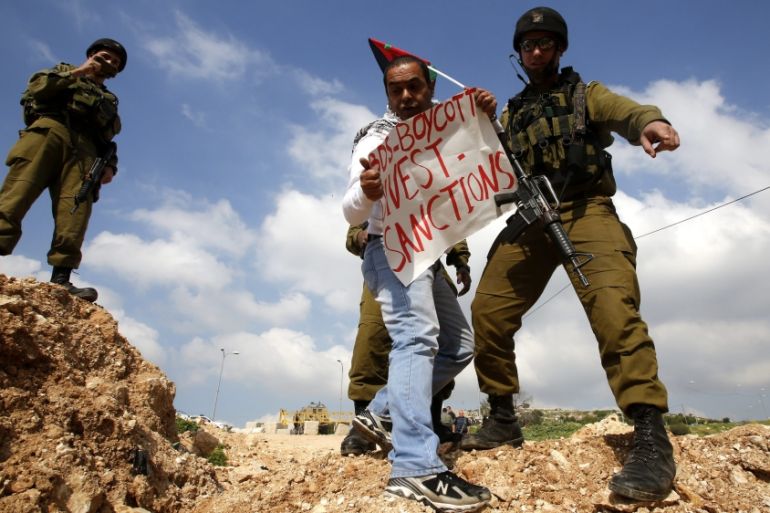Israel imposes travel ban on boycott movement leader
Critics say the move is designed to suppress the freedom of speech of Palestinian human rights activists.

Israeli authorities have refused to renew the travel document of Omar Barghouti, a leading member of a global boycott campaign, effectively imposing a ban on his movement.
Barghouti, who lives in Acre, is the cofounder of the Boycott, Divestment and Sanctions (BDS) movement – a Palestinian-led human rights campaign, which advocates for the end of Israel’s occupation of the West Bank, Gaza Strip and other Arab territories.
Keep reading
list of 4 items‘Mama we’re dying’: Only able to hear her kids in Gaza in their final days
Europe pledges to boost aid to Sudan on unwelcome war anniversary
Birth, death, escape: Three women’s struggle through Sudan’s war
|
|
The group accused Israel of trying to suppress the freedom of speech of Palestinian human rights activists, and said the move potentially demonstrated the authorities’ interest in revoking Barghouti’s residency rights.
Barghouti, who holds Israeli permanent residency, needs to apply for a travel document to go in and out of the country.
“I am unnerved but certainly undeterred by these threats,” he said in a statement.
“Nothing will stop me from struggling for my people’s freedom, justice and peace.”
The Israeli Ministry of Interior did not respond to a request for comment by the time of publication.
In recent weeks, Barghouti expressed fears that Israeli punitive measures against him and other BDS leaders would intensify.
“I hold the EU and US partially responsible should any bodily harm be inflicted on me or my BDS colleagues as a result of this vile official Israeli incitement to violence against us,” Barghouti told foreign diplomats and civil society members at a forum attended by Al Jazeera in Ramallah last month.
READ MORE – Palestine-Israel: Is peace activism serving occupation?
In late March, at an anti-BDS conference held in Jerusalem, Israel’s Interior Minister Aryeh Deri said that he was thinking about revoking Barghouti’s residency status, accusing the movement cofounder of “using his resident status to travel all over the world in order to operate against Israel in the most serious manner”.
At that same conference, which was attended by the European Union ambassador to Israel, another minister called for a “targeted civic prevention effort” against leaders and activists associated with the BDS movement – which some have called a euphemism for assassinations.
Amnesty International condemned Deri’s statement, as well as those by Israel’s Public Security Minister Gilad Erdan, who said that BDS leaders, including Barghouti, should “pay the price” for their activism.
Erdan later clarified that he was not calling for imposing any physical harm on them.
“We have witnessed an increase in threats of violence – including death threats – directed against Palestinian human rights organisations by supporters of Israel,” said Simon Reynolds, legal advocacy coordinator for the Bethlehem-based BADIL Resource Centre for Palestinian Residency and Refugee Rights.
Watch – Naomi Klein: I don’t ‘pick and choose’ on BDS
“The overall result is a toxic operating environment for Palestinian and Israeli civil society organisations; an environment which appears intended to silence legitimate, grassroots opposition to unlawful practices and policies of the Israeli government,” Reynolds told Al Jazeera.
Anti-BDS measures have been introduced in a number of countries, namely the UK, Canada and the United States. In France, boycott work has been criminalised, leading, in one incident, to the arrest of an activist for wearing a BDS T-shirt.
Israel has also stepped up efforts to silence supporters of the movement, observers said.
“Recently we have seen that any person or any body calling for BDS is being targeted, sanctioned, blamed and shamed – not only among Palestinians, but also among Israelis,” said Sawsan Zaher, a senior lawyer at Adalah, the Legal Centre for Arab Minority Rights in Israel.
“The threat Israel is seeing from BDS is so grave that tools are being used in an arbitrary way to provide a chilling effect or even punish a person indirectly for his political activity,” she told Al Jazeera.
READ MORE: BDS in the US – Boycott Israel movement gains support
In recent years, several academic institutions and student bodies around the world have endorsed boycott measures, and churches in the US namely have passed divestment resolutions.
Some large companies, such as Sodastream, the manufacturer of fizzy drink machines, have stopped operating in illegal West Bank settlements – a move boycott supporters claim as a victory.
“This act by Israel [regarding Barghouti] testifies that BDS is an effective tool and approach to realise Palestinian rights,” said Alaa Tartir, the programme director of Al Shabaka, the Palestinian Policy Network.
“Such [an] act indeed targets Omar personally, but most importantly it targets the BDS movement, and therefore the response to this act must be more BDS.”